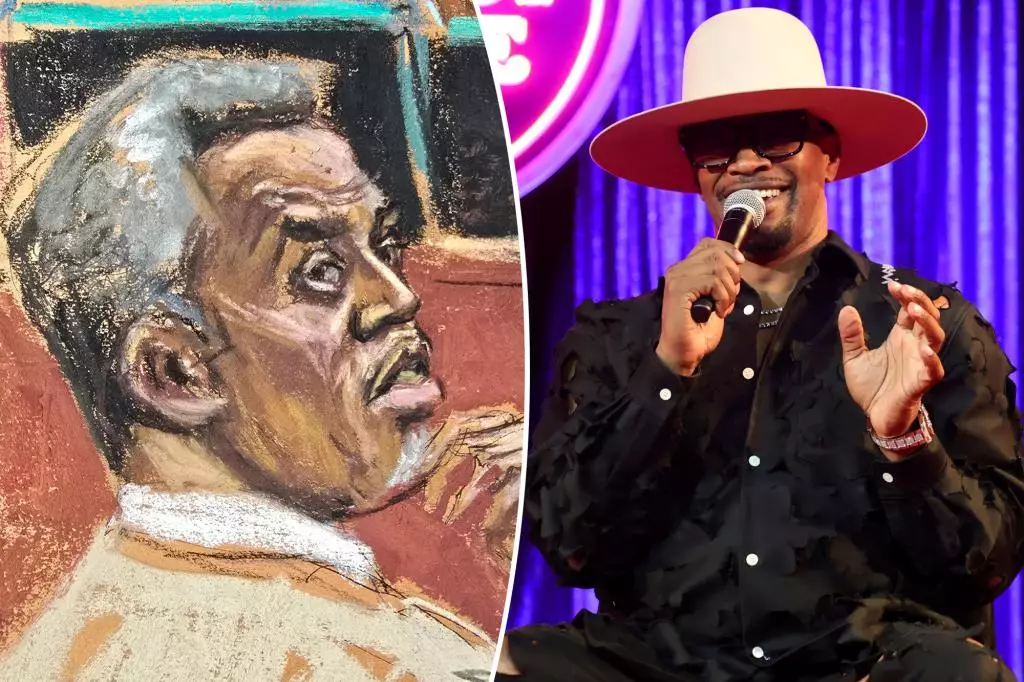In the realm of comedy, few figures can straddle the line between humor and social commentary as effectively as Jamie Foxx. During a recent performance at The Comedy Store in West Hollywood, Foxx took to the stage to riff on the ongoing sex-trafficking trial of Sean “Diddy” Combs. While this could have easily devolved into mere titillation or sensationalism, Foxx’s takedown was sharper and laden with nuance, reflecting a deeper cultural critique that goes beyond the surface of celebrity scandals.
By referring to Diddy as “nasty,” Foxx not only indulged in the theater of comedy but also highlighted the complexities of accountability in the world of hip-hop and celebrity culture. The choice of the word “nasty” carries significant weight, particularly within the Black community, where figures like Diddy have long been celebrated. Foxx’s commentary invites audiences to grapple with a disheartening reality: that those who once served as cultural icons can fall from grace spectacularly, revealing more sordid facets of their lives.
Confronting the Mythos of Masculinity
Foxx’s jokes, particularly about Diddy’s infamous catchphrase “Take that, take that,” transform what was once celebrated into something grotesque. He artfully interrogated the implications behind that phrase, suggesting that it may now conjure unsavory images rather than the empowerment it once represented within hip-hop culture. This manipulation of the catchphrase serves as a reminder of the fragile nature of masculinity and the pressures surrounding Black men in the entertainment industry. When a figure like Diddy is thrust into such turmoil, it reflects broader societal issues concerning how sexual misconduct is viewed and addressed within our communities.
Furthermore, the crassness of humor derived from testimonies surrounding an alleged act as shocking as making a male escort urinate in another’s mouth strips away some of the shock and allows audiences to confront the absurdities of power dynamics. Rather than shy away from these topics that elicit discomfort, Foxx uses them as a vehicle for discussion—questioning why such behavior might have been tolerated or overlooked for so long. His use of humor becomes a coping mechanism as well as a tool for social introspection, allowing audiences to reflect on their relationship with such figures.
A Call for Reflection on Cultural Icons
One of the most compelling elements of Foxx’s routine is his acknowledgment of the emotional impact this scandal carries for the Black community. Diddy was not just a celebrity; he was a cultural touchstone, a symbol of aspiration and success within hip-hop. When Foxx quipped that “that was our hero,” he invited listeners to consider the weight of disillusionment—an emotion that many felt when icons like Diddy engage in behavior that is morally repugnant. This sentiment strikes at the heart of a collective identity; the disintegration of a hero calls for a reevaluation of the narratives we’ve embraced.
The comedian’s performance resonates as a reluctant elegy for a tarnished legacy. Foxx urges his listeners to reconcile the joy that figures like Diddy once brought to their lives with the sobering reality of their actions. This is not merely a call to ostracize a figure but rather a plea for a balance in admiration and critical scrutiny. The complexities of idolizing individuals who often occupy their own flawed realities serve as an essential conversation in addressing accountability in culture.
The Complex Glamorization of Controversial Figures
While Foxx’s comments about Diddy entertain, they raise important questions about the glamorization of flawed figures in society, especially in the often misogynistic sphere of hip-hop. The culture has historically evaded accountability for the actions of its most prominent figures. For many, separating the art from the artist has become a necessary but complicated endeavor. Foxx’s playful ribbing does not exonerate Diddy; instead, it underscores the need for a more profound reckoning within pop culture. By reflecting on these societal challenges through laughter, Foxx offers a vital perspective on the blurred lines of celebrity influence and moral responsibility.
In a world where celebrity behavior can often go unchecked, Jamie Foxx’s uniquely candid approach to discussing Diddy’s trial serves both as entertainment and a potent critique. It is a reminder that behind the glamour and riches, the weight of responsibility cannot be ignored. As Foxx continues to weave comedy with incisive cultural commentary, his words compel us to confront the darker narratives that lurk beneath the surface of celebrity.
